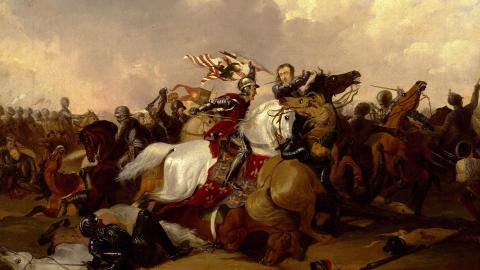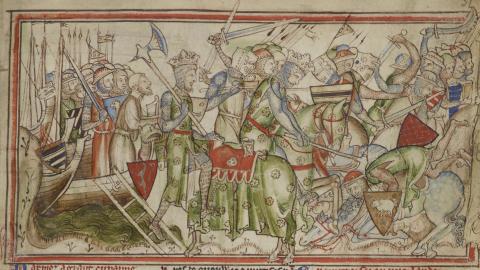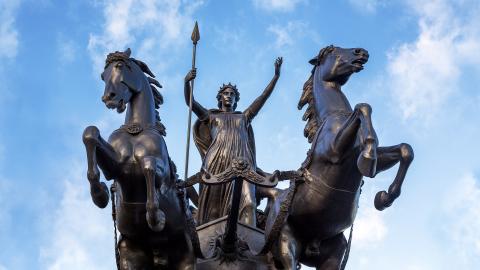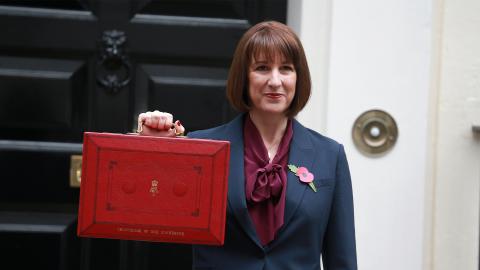The treachery of the Blue Books
In the Wales episode, Al Murray ponders the long and proud history of anti-English sentiment in these western lands, pondering such key questions as 'Why is the Prince of Wales even called the Prince of Wales?' and 'What are the sociocultural ramifications of falling into a pile of sheep dung?'
And then there’s the issue of Welsh. In the eyes of many people in England, it’s not so much a language as a punchline. Something to casually chortle about. They’ll still be making gags about it in the far future, if Red Dwarf is anything to go by ('Open communication channels, Lister. Broadcast on all known frequencies and in all known languages, including Welsh.')
But the truth about Welsh may just wipe the smirks off people’s faces. Especially anyone who proudly calls themselves 'British'. Because…
Welsh is more 'British' than English
It’s true. The English language is actually a bit of an interloper on these shores. Its earliest form was originally brought over by the hordes of Anglo-Saxon settlers who turned up in Britain after the Romans relinquished their grip on the land in the 5th Century AD. Welsh, by contrast, derives from the ancient Celtic British language known as Common Brittonic. If you had to pick a language and call it truly 'British', it would be Common Brittonic – the ancestor of Welsh – rather than Old English, the ancestor of today’s English.
Henry VIII changes/ruins everything (delete as appropriate)
After the fall of Roman Britain and the arrival of the Anglo-Saxons, the Common Brittonic spoken by indigenous Brits slowly evolved into different off-shoots. One of these became Cornish, the other became Welsh. And so, over the course of the ensuing centuries, Welsh flourished, producing masterpieces of poetry and prose, such as the Mabinogion – tales of myth and magic which fed into the legends of King Arthur.
After centuries of supremacy in its native land, the Welsh language was dealt its first major blow by Henry VIII – which is somewhat ironic, given that the Tudor dynasty was actually Welsh. In the 16th Century, Henry pushed forward laws which finally, officially made Wales part of the Kingdom of England.
Before this moment, Wales was governed in a rather messy way, with a large region known as the Principality of Wales being under the control of the Crown, and the rest of the area being a patchwork of rival territories run by aristocrats called Marcher Lords.
In his new series, Why Does Everyone Hate the English?, Al Murray is rolling up his sleeves and having a good old rummage through the many reasons why so many (ie, all of) England’s nearest neighbours have always been a tad… iffy about the nation.
Henry VIII, increasingly wary about the disordered situation and the influence of the Marcher Lords, not to mention 'some rude and ignorant people' (as the wording of the Act of Union literally puts it), brought the whole of Wales under his formal control.
The treachery of the Blue Books
Cut to the 19th Century and a public inquiry into the state of education in Wales. Which sounds dry and tedious at first glance, but this was a shocking body blow to Welsh patriots. The report, carried out by commissioners who went around Wales to collect data, was published between blue covers and condemned Wales for being a backward land, its progress retarded by Welsh itself. 'The Welsh language is a vast drawback to Wales and a manifold barrier to the moral progress of the people,' the report thundered. 'It is not easy to overestimate its evil effects.'
The 'Treachery of the Blue Books' came at a time when Welsh was under increasing threat from outside influences. Railways sprang up, English-language newspapers were distributed, English workers arrived to work in the mines. A census carried out in 1911 showed for the first time that Welsh had become a minority language in Wales. It was a wake-up call. Indeed, Plaid Cymru, the national political party of Wales, was originally founded to preserve the Welsh language.
A Celtic renaissance?
As the 20th Century went on, Welsh became an increasingly marginal language, leading to its current, scoffed-at status among the English. Yet, in recent history there’s also been a concerted effort to raise its reputation. Welsh is here to stay, as can be seen, and heard, with the bilingual road signs and public announcements in Wales. (There have been some amusing mistakes made though – back in 2008, the Welsh part of a bilingual road sign saying 'No entry for heavy goods vehicles' actually read 'I am not in the office at the moment. Send any work to be translated.')
Welsh continues to play a role in British pop-culture too. There’s the Welsh language TV channel, S4C, for one thing. And, singer-songwriter Gwenno released a Welsh language album in 2014, followed up this year by an album in Cornish – the sister language of Welsh – which could be signs of a slow Celtic renaissance in the offing.
So, the next time anyone’s tempted to chortle at the Welsh language, they’d do well to remember how it’s survived everything from Anglo-Saxon invaders to Henry VIII’s ego to the Treachery of the Blue Books, to thrive in the 21st Century. And anyone who thinks otherwise is a carrot (Welsh translation: moron).















